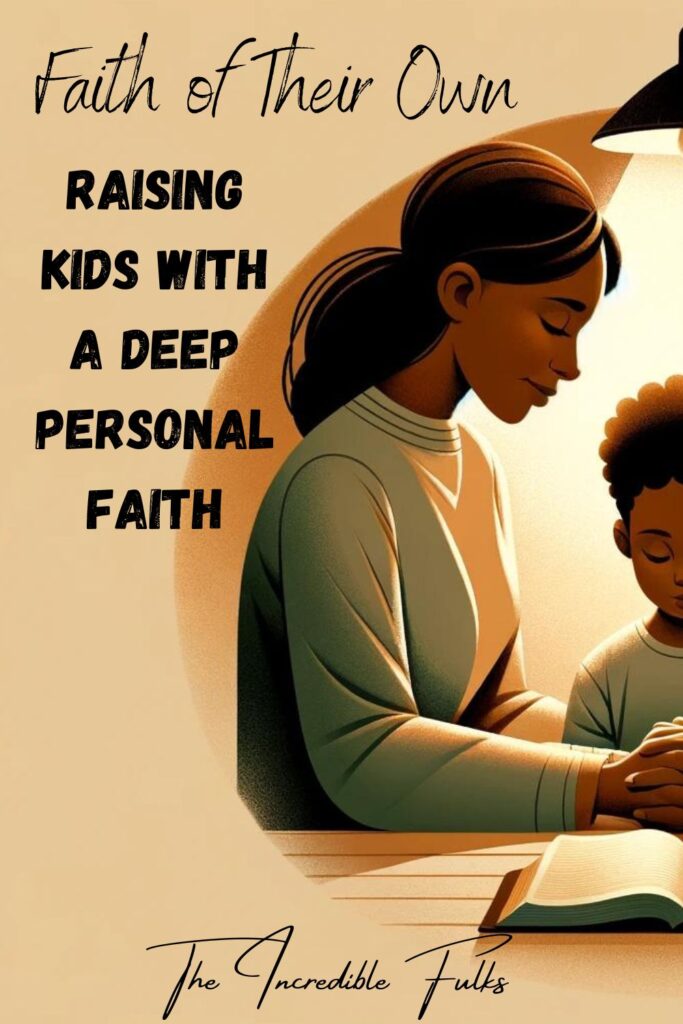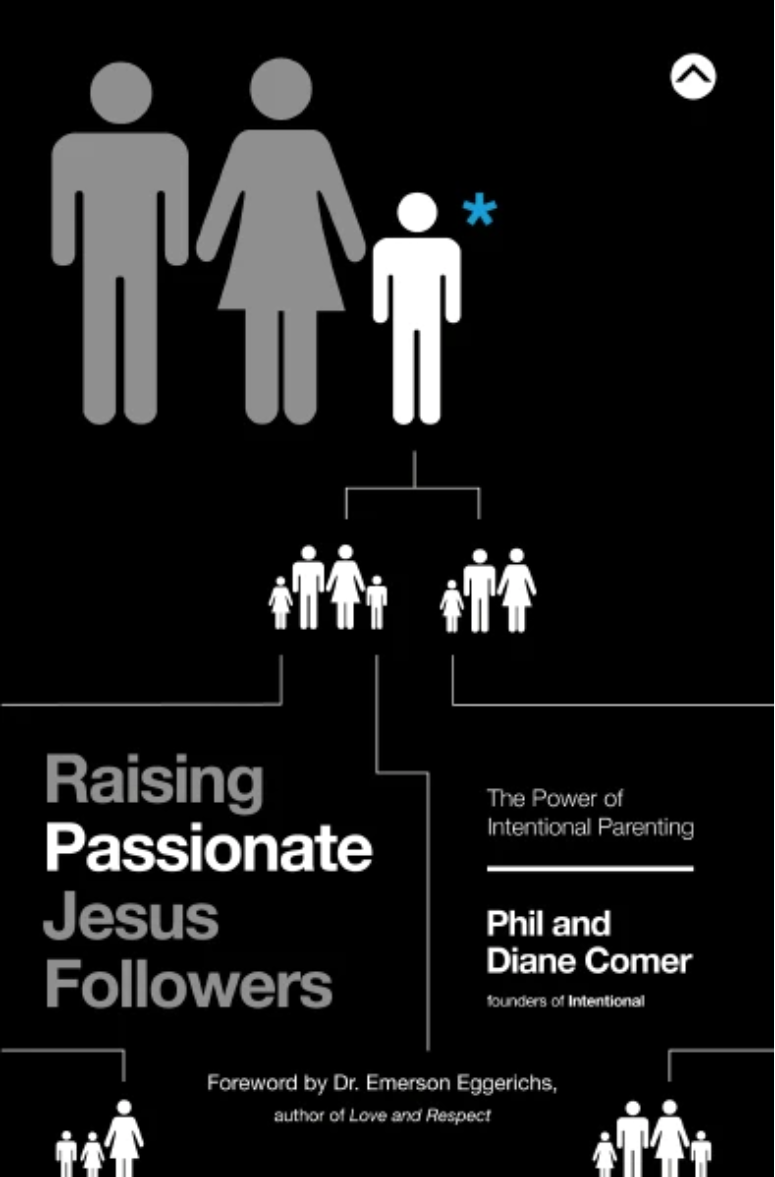In today’s rapidly changing (and not for the better) world, instilling a genuine faith in your children is more crucial than ever. Faith is not just a set of beliefs handed down from generation to generation. It is a very personal and individual journey. It shapes your values, guides your decisions, and provides comfort in times of uncertainty. For you as parents and guardians, the challenge is not merely to pass on the rituals and traditions of faith. It is to also nurture a deep, personal conviction in the hearts of your children.
The distinction between inherited faith and personal conviction is so important to know. Inherited faith, while valuable, often rests on the practices and beliefs of one's family or community. It is a starting point, a framework within which a child begins to understand the concept of belief. Your children will form a relationship with Christ, through your own relationship with Christ.
It is JUST a starting point though. If you never go deeper, then this faith is likely to “disappear” when your child moves out the house or when they see you struggle with your faith. Faith that is never rooted, will be as seeds scattered in the cracks of pavement. They will sprout and grow, but as soon as the weather changes for the worse, they wither and die.
For faith to truly take root in your child, it must evolve into a personal conviction. That is a genuine, heartfelt relationship with God that each individual chooses and embraces for themselves. This personal faith is dynamic and resilient, capable of withstanding the questions and doubts that inevitably arise throughout life's journey. It will stay even when the faith of those around them faulter or even through transitions in life.
Why is this distinction important? Because faith built on personal conviction is more likely to remain a guiding force in a child’s life, even as they grow and face the complexities of the modern world. It becomes a part of their identity, influencing their actions and decisions in a way that inherited faith alone won't. Your goal, then, is to equip your children not just with the knowledge of your faith but with the tools they need to discover its meaning and relevance for themselves.
Understanding the Biblical Foundation of Faith
Faith is a cornerstone of the Christian life. So understanding its biblical foundation is essential for nurturing a genuine relationship with God. Hebrews 11:1 offers one of the most profound definitions of faith found in the Bible. “Now faith is confidence in what we hope for and assurance about what we do not see.” This verse captures the essence of faith. A trust in God and His promises, even when they are not visible or immediately apparent to us.
This scripture invites us to view faith not merely as belief in a set of doctrines but as a deep, confident trust in God and His plans for us. It speaks to the heart of what it means to have faith. Living with confidence in God’s goodness and His sovereignty, even in the absence of physical evidence. Faith, then, is about trusting in the character of God and His unwavering faithfulness towards us.
How does this foundation impact the way we introduce faith to children?
Understanding faith as defined in Hebrews 11:1 impacts how you introduce your children to the concept of believing in God. It means that you teach them faith is more than just believing in the stories of the Bible. It is about developing a trust in God that shapes how they view the world and their place in it. Here are some ways this understanding of faith can guide your approach:
- Encourage Trust in God's Character: Help your children understand that faith is trusting in the goodness and faithfulness of God, even when they cannot see the outcome of a situation. Share stories from the Bible and your own life where faith in God’s character provided assurance in difficult times.
- Model Confidence in God's Promises: Let you children see how you rely on God’s promises in your daily life. Your example of confidence in God's word teaches them to find security in their faith. This fosters a personal conviction that God is trustworthy.
- Discuss the Unseen Aspects of Faith: Engage in conversations about the aspects of faith that are not visible or easily understood. This can include discussing how you see God’s hand in creation, how you feel His presence. Or even how you trust in His promises for the future.
- Foster an Environment of Hope: Teach your children that faith is closely linked to hope. By believing in what you cannot see, you maintain hope for God's plans for your lives and for the world. Encourage them to hope confidently in God, even in uncertain times.
By grounding your children’s understanding of faith in the biblical definition provided in Hebrews 11:1, you are laying a solid foundation for their spiritual journey. This approach helps them see faith not just as a set of beliefs. It helps them see it as a personal and dynamic relationship with God that is built on trust, confidence, and hope.
Leading by Example
The Bible underscores the pivotal role parents play in shaping their children's faith. Deuteronomy 6:6-7 and Proverbs 22:6 are two scriptures that emphasize the importance of parents living out their faith as a fundamental way to guide their children towards a genuine relationship with God.
Deuteronomy 6:6-7 instructs, “These commandments that I give you today are to be on your hearts. Impress them on your children. Talk about them when you sit at home and when you walk along the road, when you lie down and when you get up.” This passage highlights the importance of integrating faith into the fabric of daily life. This makes it a constant topic of conversation and reflection.
Proverbs 22:6 advises, “Train up a child in the way he should go, and when he is old he will not turn from it.” This proverb underscores the long-term impact of instilling sound values and faith in children from an early age.
What are practical ways parents can model faith in daily life (prayer, service, integrity)?
Living out one's faith in the presence of children can profoundly influence their spiritual development. Here are some practical ways parents can embody their faith in everyday life:
- Prayer: Make prayer a regular part of your daily routine, including meal times, before bedtime, and during family devotions. Invite your children to pray with you and encourage them to offer their prayers aloud. This not only teaches them how to communicate with God but also shows them that prayer is a natural and integral part of life.
- Service: Actively participate in service opportunities within your community or through your church. Involve your children in age-appropriate service projects to demonstrate faith in action. This could include volunteering at a local food bank, participating in community clean-up days, or helping a neighbor in need. Through service, children learn compassion and understand the importance of helping others as a tangible expression of God's love.
- Integrity: Exhibit integrity in your dealings with others, whether it's in business, within your family, or when interacting with strangers. Children are keen observers and will notice when your actions align with your beliefs. By choosing honesty, fairness, and kindness, you model how to live out faith through ethical behavior.
- Biblical Engagement: Engage with the Bible both personally and as a family. Let your children see you reading and studying Scripture, and share what you're learning with them. Incorporate family Bible study into your routine, discussing stories and principles in ways that are relatable to their experiences.
- Worship and Church Involvement: Regularly attend church services and involve your family in the life of your church community. Participation in worship, Sunday school, and church events provides a sense of belonging to a faith community. It also shows children the value of corporate worship and fellowship.
By integrating these practices daily, you are nurturing your spiritual growth and setting a powerful example for your children. They learn the importance of faith, the value of living according to biblical principles, and the joy of a close relationship with God.
Encouraging Questions and Doubts
A healthy faith journey includes wrestling with questions and doubts. 1 Peter 3:15 encourages believers to always be prepared to give an answer to everyone who asks you to give the reason for the hope that you have, but to do so with gentleness and respect. This scripture affirms the importance of understanding and articulating your faith and sets a tone of openness and grace in discussions about belief.
This verse reminds us that questions about faith are an opportunity to deepen your understanding and articulate the basis of your hope in Christ. It emphasizes the need for readiness—not defensiveness—to engage in conversations about faith. You should be equipped with knowledge, understanding, and, most importantly, compassion.
How can you create a safe space for children to express doubts and ask questions?
Creating an environment where children feel comfortable expressing their doubts and questions about faith is important for their spiritual development. Here are several ways to foster such a space:
- Normalize Doubt: Begin by affirming that doubt is a normal part of faith development. Share your experiences of questioning and how those moments have strengthened your faith. This acknowledgment helps children understand that they are not alone or abnormal in their questioning.
- Listen Actively: When your child comes to you with questions or doubts, give them your full attention. Listen without judgment and resist the urge to provide immediate answers. Sometimes, they may just need to verbalize their thoughts and feel heard.
- Respond with Gentleness and Respect: In line with 1 Peter 3:15, address their questions with gentleness and respect. This approach encourages open dialogue and conveys that their thoughts and feelings are valid and important.
- Explore Together: If you don’t have an immediate answer to their questions, take it as an opportunity to explore the answers together. Research, read, and discuss relevant Bible passages or consult with a pastor or youth leader. This collaborative search can be a faith-building experience for both you and your child.
- Encourage Journaling: Suggest that your child keeps a journal of their questions and insights they gain as they explore faith. Journaling can be a powerful tool for reflection and seeing how their understanding of God grows over time.
- Foster a Community of Inquiry: Involve your children in a faith community that welcomes questions. Some even offer classes or groups designed to address doubts and deepen understanding. Being part of a community that values open discussion can reinforce that they are not alone in their journey.
By taking these steps, you are helping your child navigate their doubts and questions and also guiding them towards a deeper, more resilient faith. Encouraging inquiry demonstrates that faith can withstand scrutiny and that questioning is not a sign of weakness. Questioning is a pathway to a more profound understanding and relationship with God.
Making Faith Personal Through Experiences
James 2:17 boldly states, “In the same way, faith by itself, if it is not accompanied by action, is dead.” This scripture serves as a powerful reminder that true faith is not passive; it is active and alive. And it is demonstrated through your actions and how you live your life. For children, experiencing this dynamic aspect of faith firsthand can be incredibly impactful, transforming abstract concepts into tangible realities.
The message of James 2:17 is clear: genuine faith is always expressed through actions that reflect your beliefs. This principle is crucial in teaching children that faith is not merely something you profess with your mouths. It is also something you live out in your daily actions. It underscores the importance of putting your faith into practice, showing love and service to others. This will be evidence of your faith in Jesus Christ.
What are some activities that can help children experience faith in action (service projects, mission trips)?
To help children understand and embody the message of James 2:17, here are some activities that can bring faith to life through action:
- Participate in Service Projects: Engage in local service projects as a family or with your church community. This could involve volunteering at a soup kitchen, organizing a clothing drive for those experiencing homelessness, or participating in a community clean-up. These activities help children see the impact of serving others and how it reflects the love of Christ.
- Mission Trips: If possible, participate in family-friendly mission trips organized by your church or a reputable mission organization. Experiencing different cultures and serving in diverse communities can broaden children’s perspectives. It can also deepen their understanding of global needs and how faith can be a force for good.
- Acts of Kindness: Encourage simple acts of kindness in daily life. This can be writing thank-you notes, helping a neighbor with yard work, or baking cookies for local community workers. These small gestures can teach children that living out one’s faith can happen in everyday actions.
- Support a Cause: Choose a cause or a charity to support together as a family. Involve your children in the decision-making process and find ways to contribute, whether through fundraising, awareness campaigns, or volunteering. This activity can show children the power of faith-driven advocacy and generosity.
- Prayer Walks: Take prayer walks in your neighborhood or community, praying for the people, schools, businesses, and churches you pass. This practice can help children understand the power of prayer in action and the importance of interceding for others.
- Environmental Stewardship: Teach children about the importance of caring for God’s creation through environmental stewardship. Activities like planting trees, recycling, and conserving water are practical ways to live out faith. This is honoring the Creator and caring for His creation.
By engaging in these activities, children can experience firsthand the joy and fulfillment that comes from putting their faith into action. These experiences help to make faith personal and relevant. They also teach children that their beliefs can have a positive impact on the world around them. Through active participation in faith-driven activities, children learn that their faith is a living, breathing part of who they are. It is capable of inspiring change and expressing God’s love in tangible ways.
Looking for ways to teach about Military Service and Sacrifice, check out my article! Teaching Kids about Military Service and Sacrifice
Providing Biblical Teaching and Discipleship
The nurturing of a child's faith is deeply rooted in the teaching and application of Scripture. Ephesians 6:4 encourages parents to bring up their children in the training and instruction of the Lord. 2 Timothy 3:16-17 asserts that all Scripture is God-breathed and is useful for teaching, rebuking, correcting, and training in righteousness, so that the servant of God may be thoroughly equipped for every good work. Together, these verses highlight the vital role of the Bible in forming a solid foundation for your child.
How do you share biblical stories and principles at an age-appropriate level?
To effectively teach children the Word of God and foster discipleship, here are some recommended resources and strategies:
- Age-Appropriate Bibles: Invest in age-appropriate Bibles for your children. There are illustrated story Bibles for younger children and study Bibles for teenagers. These versions present biblical stories and principles in ways that are accessible and engaging for their developmental stage.
- Family Devotional Guides: Utilize family devotional books that offer daily readings, questions for discussion, and prayers. These guides provide a structured way to explore Scripture together and apply its lessons to daily life.
- Online Resources and Apps: There are numerous online resources and apps designed for family devotions and biblical teaching. Websites like Focus on the Family or The Bible Project offer videos, articles, and interactive content that can help bring biblical stories to life.
- Bible Storybooks: For younger children, Bible storybooks are a fantastic way to introduce them to the major stories of the Bible. Look for books that are richly illustrated and written in language that is easy for children to understand.
- Discussion Prompts: Use discussion prompts to engage children in conversations about biblical stories and principles. Ask questions that encourage them to think about the meaning of the story and its relevance to their lives. Examples include “What do you think this story teaches us about God?” “How can we apply this lesson in our family?”
- Memory Verses: Encourage memorization of key Bible verses. Choose verses that are particularly meaningful or applicable to your child’s life. Memory verses can be a fun and rewarding way to embed Scripture in a child's heart and mind.
- Christian Children’s Literature: Explore Christian children’s books that weave biblical principles into compelling stories. These books can serve as a supplement to direct Bible study. They will help children see how Christian values can be lived out in everyday situations.
By integrating these resources and approaches into your family's routine, you create a rich soil in which the seeds of faith can grow. Teaching children the Word of God and engaging them in discipleship is a journey that bears fruit over time. It equips them to navigate life with wisdom, courage, and a deep-seated faith.
Encouraging Community and Fellowship
The New Testament book of Acts provides a vivid snapshot of the early Christian community. It illustrates how communal life and fellowship were instrumental in nurturing and sustaining the believers' faith. Acts 2:42-47 describes how the early Christians devoted themselves to the apostles' teaching, fellowship, breaking of bread, and prayer. They did this all while sharing everything they had, serving each other, and experiencing growth in their numbers daily. This passage highlights the transformative power of community in the Christian faith, emphasizing the importance of gathering together for teaching, worship, and mutual support.
The early Christian community, as depicted in Acts 2:42-47, serves as a model for how Christians today can engage in life together. The passage reveals that the believers' dedication to teaching, fellowship, shared meals, and prayer resulted in a strong, supportive community that was attractive to outsiders. This dynamic of communal life was not only about nurturing individual faith but also about creating a collective witness that drew others to the faith.
How do you involve children in a faith community (church, youth groups)?
Involving children in a faith community is critical for several reasons:
- Teaching and Learning: Just as the early Christians devoted themselves to the apostles' teaching, children benefit from being part of a community where they can learn about God, the Bible, and how to live out their faith. Sunday school classes, children's church, and youth groups provide structured environments for this kind of learning and growth.
- Fellowship: Engaging with a faith community offers children the opportunity to build relationships with peers and adults who share their values. These relationships can provide encouragement, support, and positive role models during crucial developmental stages.
- Service Opportunities: Many churches and faith communities offer service and outreach opportunities that allow children to put their faith into action. Participating in these activities helps children understand the importance of serving others and can foster a sense of purpose and belonging.
- Worship and Spiritual Practices: Being part of a faith community introduces children to corporate worship and spiritual practices. Experiencing different forms of prayer, worship, and Bible study can enrich their spiritual lives and provide them with a variety of tools for connecting with God.
- Support Network: A faith community provides a support network not just for children but for the entire family. It can be a source of comfort and assistance during difficult times and a place to celebrate together during joyous occasions.
- Sense of Belonging: Involvement in a faith community gives children a sense of belonging to something larger than themselves. It helps them understand that they are part of the global body of Christ and that their faith connects them with believers across the world.
Fostering connections within a faith community is essential for the spiritual development of children. It provides a supportive environment where faith can be explored, questions can be asked, and where children can see the love of God in action through the lives of others. As they grow and mature, the influence of a vibrant, loving community can anchor them in their faith and equip them to navigate the challenges of life with resilience and hope.
If you are having a hard time speaking with other women in Christian settings, check out my article Talking with Christian Friends (Why is it so hard?)
Celebrating Milestones and Answered Prayers
In the Book of Joshua, you find a powerful example of commemorating God's faithfulness. Joshua 4:6-7 describes how the Israelites set up twelve stones as a memorial after crossing the Jordan River into the Promised Land. This act served as a physical reminder for future generations of the power and faithfulness of God. Similarly, marking and celebrating spiritual milestones and answered prayers in the lives of children can serve as enduring reminders of God's presence and activity in their personal faith journey.
Joshua's directive to create a memorial with stones from the Jordan River was intended to prompt questions and storytelling among children and future generations about God's miraculous deeds. This tangible reminder was a way to keep the memory of God's deliverance and faithfulness alive, fostering a sense of awe and gratitude towards God. It underscores the importance of remembering and celebrating God's work in your life, providing a foundation of faith for both the individual and the community.
What are some ideas for commemorating moments when faith becomes real or personal for a child (baptism, answered prayers)?
Celebrating spiritual milestones and answered prayers plays a crucial role in nurturing a child's faith, serving as tangible evidence of God's love and faithfulness. Here are some ideas for commemorating these significant moments:
- Baptism Celebration: Baptism is a pivotal moment in the life of a believer. Celebrate this occasion with a special gathering of friends and family. Consider giving your child a keepsake, such as a personalized Bible or a piece of jewelry with a cross, to remember the day.
- Answered Prayer Journal: Encourage children to keep a journal of their prayers, including the date, the prayer request, and the date it was answered. Reviewing this journal together can be a powerful way to recall and celebrate answered prayers.
- Faith Milestone Certificates: Create or purchase certificates to commemorate spiritual milestones such as your child's first Bible, their decision to follow Christ, baptism, and participation in their first mission trip or service project. These certificates can be framed and displayed as reminders of their spiritual journey.
- Spiritual Birthday Party: Just as we celebrate physical birthdays, consider celebrating the anniversary of your child's spiritual rebirth or decision to follow Christ. This can be a meaningful annual tradition that emphasizes the importance of their faith journey.
- Memory Box: Create a memory box or a scrapbook where you can keep tangible mementos of faith milestones, such as photos from baptism, notes of encouragement from church members, certificates, and other significant items. This box can become a treasure trove of reminders of God’s faithfulness throughout their life.
- Blessing Stones: Following the example of Joshua, create “blessing stones” for significant faith milestones. Write the date and a brief description of the milestone on a stone and keep it in a special place. Over time, these stones can serve as a visual testimony of God's activity in your child's life.
Celebrating these milestones and answered prayers not only reinforces your child’s personal faith journey but also connects them to the broader story of God's faithfulness to His people. It teaches children to recognize and remember God’s presence and action in their lives, building a foundation of faith that can sustain them throughout their lives.
Conclusion
Nurturing genuine faith in children is a profound and vital journey, one that shapes their understanding of love, guides their decisions with wisdom, and anchors them in hope. This journey, as you have seen through biblical teachings, involves not just imparting knowledge but fostering a personal and active relationship with God. Each step, from leading by example to celebrating faith milestones, plays a critical role in guiding your children towards embracing a faith that is truly their own.
In this endeavor, patience and persistence are key. The path of faith development unfolds in God’s perfect timing, often through a mixture of sunny days and storms. It’s a process filled with learning opportunities for both parent and child, requiring continuous effort, fervent prayer, and trust in the Lord’s guiding hand. Remember, the seeds of faith you plant and nurture within the hearts of your children have the potential to grow into a strong, personal relationship with God, bearing fruit that lasts a lifetime.












